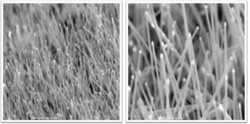Sep 24 2010
Illuminex, a nanotechnology company developing processes to manufacture functional nanomaterials for sustainable energy applications, is applying recent advancements in its patented anodic aluminum oxide nanowire array production process to fabricate crystalline silicon nanowire (SiNW) array photovoltaic materials for commercial solar devices.
Their bottom-up approach uses molecular self-assembly to manufacture aluminum catalyzed SiNW. Their process is now demonstrating photovoltaic conversion efficiencies that, when scaled macroscopically, are comparable to crystalline silicon wafer solar cells, except they use 1/100th the amount of silicon per meter of active solar cell area, thereby yielding very significant cost advantages. The technology holds the promise to reduce the cost of solar electricity from the current value of $0.20-0.40/kWh to under $0.10/kWh, making it competitive with other forms of electrical energy generation.
 Illuminex-fabricated silicon nanowire arrays for novel photovoltaic device applications. Each nanowire is 1/1000th the thickness of a human hair.
Illuminex-fabricated silicon nanowire arrays for novel photovoltaic device applications. Each nanowire is 1/1000th the thickness of a human hair.
Based in Lancaster, PA and founded by MIT PhD nanomaterial scientists, Illuminex is commercializing nanowire array production processes and device applications that leverage the distinct physical properties manifested in the nanowire arrays. The company's recent advancement in manufacturing crystalline silicon uses only aluminum and glass as the precursor materials. Illuminex photovoltaic materials can potentially deliver the conversion efficiency and other properties that established crystalline silicon as the dominant material in a $30 billion photovoltaic industry, but at a much lower manufactured cost.
The potential for Illuminex to introduce disruptive functional nanomaterials to the solar cell market lies in its unique, low-cost methods to produce SiNW arrays using aluminum in a multi-functional capacity (structure, template, catalyst, dopant source, electrode isolator, and anode). Illuminex nanostructured materials can be produced at growth rates up to 10 microns/minute with minimal waste materials or process by-products. This is accomplished using a standard chemical vapor deposition (CVD) reactor and employing the Vapor-Liquid-Solid (VLS) growth method with Illuminex substrate technology in a manner that is readily scalable for mass production.
Illuminex, in collaboration with the Pennsylvania State University, recently applied its VLS and anodic aluminum processes to fabricate these breakthrough SiNW- array-based photovoltaic devices. In June, the research group demonstrated the growth of macroscopic SiNWs on low-cost substrates and the fabrication of a VLS SiNW photovoltaic device (2.5 x 2.5 mm) with an efficiency of 2.4% and single aluminum catalyzed nanowire p-i-n photovoltaic junctions with a preliminary efficiency of 5.3%.
According to Illuminex CEO Joe Habib, “This is comparable to the highest single nanowire junction efficiency reported to date, 3.3% (Leiber/Harvard. Nature, 2007). Our next step is to make an array over 1 cm² using aluminum on glass resulting in >5% device efficiency. Then we move on to get that 20% efficiency obtained using crystalline silicon wafers at a fraction of the cost using 1/100th the material.”
To accelerate its photovoltaic materials and development efforts, and with financial assistance from the State of Pennsylvania, the company just completed construction of a new silicon processing laboratory that houses a high-capacity chemical vapor deposition system for SiNW growth. Illuminex has three laboratories in the Burle Industrial park (formerly RCA) totaling over 5500 sq. ft.
Illuminex can fabricate the silicon nanowire diodes on glass, metal, threads or virtually any surface that can be coated with a thin Al layer These materials are particularly well suited to PV panel-based solar power generation, and the Company is currently collaborating with Philadelphia University to produce a photovoltaic textile. The textile consists of threads covered with pillar-shaped silicon p-n junction diode nanowire arrays emanating about the periphery of a 200 micron diameter thread for looming into an electronic or “smart” textile.